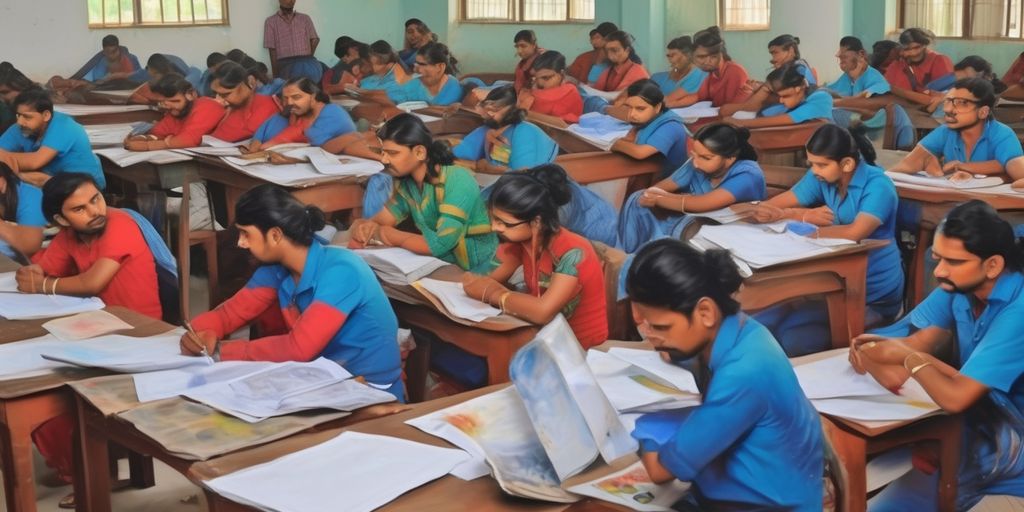This guide helps you master the CLAT exam. We cover all you need to know, from the test basics to specific strategies. Whether you’re preparing for CLAT 2025 or CLAT 2026, this article will assist you in your preparation. Dive in to find study tips, recommended books, and ways to stay motivated throughout your preparation journey.
Key Takeaways
-
Understand the structure and marking scheme of the CLAT exam.
-
Focus on essential topics for each subject, including English, Legal Reasoning, and Math.
-
Utilize mock tests and previous year papers to enhance your preparation.
-
Create a balanced study plan with realistic goals and regular reviews.
-
Stay motivated by setting milestones and rewarding yourself for achievements.
Understanding the CLAT Exam Structure
The first step towards effective CLAT preparation is understanding the exam pattern thoroughly. A comprehensive grasp of the paper structure empowers candidates to tailor their study plans effectively. The CLAT exam comprises 120 questions, covering various subjects. Here is a breakdown of the sections:
English Language: Key Topics to Focus On
Reading Comprehension Strategies
To excel in reading comprehension, practice reading passages regularly. This will help you improve both speed and understanding. Summarize passages to enhance comprehension and retention. Focus more on genre-specific reading to improve your language skills. Read books, magazines, newspapers, and novels to enhance your vocabulary.
Vocabulary Building Techniques
Expand your vocabulary by learning new words daily. Use them in sentences to remember their meanings. Brush up on grammar rules and practice them through exercises. You can use resources like magazines, Aeon Essay, and 3 Quarks daily. They publish articles and essays written in complex and competent English, which helps aspirants increase their reading level.
Grammar and Sentence Correction
Understanding grammar rules is crucial for the CLAT exam. Practice grammar exercises to get a good grasp of sentence structure and correction. Regular practice will help you identify and correct errors quickly. This will also improve your overall writing skills.
Maintaining a regular reading schedule and practicing comprehension and speed is essential. Work on any areas you have overlooked to ensure a well-rounded preparation.
Current Affairs and General Knowledge: Staying Updated
Staying updated with current affairs and general knowledge is crucial for the CLAT exam. This section tests your awareness of what’s happening around the world, especially in legal and constitutional matters. Regularly reading newspapers, magazines, and reliable online sources can help you stay informed.
Daily News Sources
To keep up with daily news, make it a habit to read English newspapers. Focus on national and international news, significant legal updates, and editorials. This will enhance your understanding of various issues and help you in mastering the legal section of the CLAT exam: comprehensive guide emphasizing legal current affairs, collaborative learning, consistency, and psychological preparation for success.
Monthly Compilations
Monthly compilations of current affairs can be very useful. These compilations summarize the most important events of the month, making it easier for you to review and remember. You can find these compilations in magazines or online portals dedicated to CLAT preparation.
Important Topics for CLAT
When preparing for the current affairs section, pay special attention to topics related to human rights, constitutional developments, and significant legal cases. These topics are often highlighted in the exam. Make concise notes of important events and facts, and revise them frequently to remember the information effectively.
Participating in quizzes and discussions can also enhance your GK preparation. This not only helps in retaining information but also makes the learning process more engaging and fun.
Legal Reasoning: Mastering the Concepts
Legal Reasoning preparation for CLAT is the essential skill that enables an individual to thoroughly evaluate a factual situation by utilizing a given principle of law. It is important to understand that you don’t necessarily need to know more than what is explicitly provided in the principle or passage to engage in effective legal reasoning. However, being well-acquainted with the principle can significantly expedite the process of applying it to various scenarios. Think of it like having a comprehensive understanding of the rules of your favorite sport before stepping onto the field to play; this knowledge not only enhances your performance but also allows you to navigate the complexities of the game with greater confidence and skill.
Understanding Legal Principles
Start by understanding basic legal principles and terminologies. Use introductory books on law to get familiar with concepts like Contracts, Torts, and Criminal law. This foundational knowledge will help you tackle legal reasoning questions more effectively.
Important Case Laws
Familiarize yourself with various legal case scenarios. Analyze important case laws related to Family law, Property law, and Intellectual property. This will help you understand how legal principles are applied in real-world situations.
Practice Questions and Analysis
Practice is key to mastering legal reasoning. Solve a wide range of legal reasoning questions, including those from previous CLAT exams. Regular practice will help you get a feel for the type of questions asked and improve your speed and accuracy.
Tip: Stay updated with current legal developments to enhance your understanding of Judiciary and other legal areas. This will not only help you in the exam but also in your future legal career.
Logical Reasoning: Enhancing Analytical Skills
Logical reasoning tests your ability to think critically and analyze information. Consistent practice is key to mastering this section. Engaging with a variety of logical reasoning problems hones problem-solving skills and boosts confidence in approaching different question types.
Quantitative Techniques: Essential Math Skills
Mastering the quantitative techniques section of the CLAT exam requires a solid understanding of basic math concepts. Consistent practice is key to gaining confidence and proficiency in this area. Focus on arithmetic, algebra, and data interpretation, as these are crucial topics for the exam.
Important Math Topics
To excel in the quantitative section, ensure you have a strong grasp of the following topics:
-
Arithmetic: Percentages, ratios, and averages
-
Algebra: Basic equations and inequalities
-
Geometry: Shapes, areas, and volumes
-
Data Interpretation: Reading and analyzing graphs and tables
Shortcut Methods and Tricks
Developing shortcuts and tricks can save valuable time during the exam. Here are some tips:
-
Memorize multiplication tables and squares up to 20.
-
Learn quick methods for calculating percentages and ratios.
-
Practice mental math regularly to improve speed.
Practice Problems and Solutions
Regular practice is essential for mastering quantitative techniques. Solve problems from various sources and analyze your performance. Focus on areas where you make mistakes and work on improving them. Additionally, take mock tests to simulate the exam environment and manage your time effectively.
Remember, mastering the quantitative section is not just about solving problems but also about developing a strategy to tackle them efficiently.
By following these top 10 tips for quantitative section for CLAT 2024, you can enhance your math skills and perform well in the exam. Prioritize practice, manage time, and stay calm and confident throughout your preparation.
Creating an Effective Study Plan
Creating a study plan is crucial for CLAT preparation. A well-organized plan helps you cover all subjects evenly and manage your time effectively. Break down the syllabus into smaller, manageable parts and set aside time for each. Your plan should include learning new topics, revising, and taking mock tests.
Setting Realistic Goals
Set achievable goals to keep yourself motivated. Start by identifying your strengths and weaknesses. Allocate more time to subjects you find challenging. Remember, it’s important to be realistic about what you can achieve in a day.
Daily and Weekly Schedules
Create daily and weekly schedules to stay on track. A daily schedule might include specific tasks like reading comprehension practice or solving math problems. A weekly schedule should cover all subjects and include time for revision and mock tests.
Balancing Different Subjects
Balance your study time across all subjects. Don’t neglect any section, as each one is important for your overall score. Spend more time on areas where you need improvement, but make sure to review all subjects regularly.
Importance of Mock Tests and Previous Year Papers
Mock tests and previous year papers are crucial for mastering the CLAT exam. They help you get used to the exam format and understand the types of questions asked. Regular practice with these tools can boost your confidence and improve your time management skills.
Staying Motivated Throughout Your Preparation
Preparing for the CLAT exam can be a long and sometimes daunting journey. Staying motivated is essential to not just surviving this period but thriving throughout it. Here are some strategies to help you maintain your motivation and keep stress at bay:
Recommended Books and Resources for CLAT
When preparing for the CLAT exam, having the right books and resources is crucial. These materials not only provide the necessary knowledge but also help in building a strong foundation for each subject. Here are some top recommendations to guide you through your CLAT journey.
Looking for the best books and resources to ace the CLAT exam? Visit our website for a curated list of top recommendations that will help you succeed. From comprehensive study guides to practice tests, we have everything you need to prepare effectively. Don’t miss out on these essential resources!
Conclusion
Preparing for the CLAT exam can seem like a big task, but with the right plan and resources, you can do it. This guide has given you a clear path to follow, from understanding the exam to focusing on each subject. Remember, it’s important to stay consistent, practice regularly, and keep yourself motivated. Use the tips and strategies shared here to make your study time more effective. Good luck on your journey to mastering the CLAT exam!
Frequently Asked Questions
What is the CLAT exam?
The CLAT exam is an entrance test for students who want to study law in top law schools in India. It includes sections like English, Current Affairs, Legal Reasoning, Logical Reasoning, and Quantitative Techniques.
How should I start preparing for CLAT 2026?
Begin by understanding the exam pattern and syllabus. Make a study plan, gather good study materials, and start with the basics of each subject. Regular practice and revision are key.
Which subjects are most important for CLAT?
All sections are important, but focus on English, Current Affairs, Legal Reasoning, Logical Reasoning, and Quantitative Techniques. Each requires different skills and preparation methods.
Why are mock tests important for CLAT preparation?
Mock tests help you understand the exam pattern, manage your time, and identify your strengths and weaknesses. They are crucial for improving your speed and accuracy.
What are some good books for CLAT preparation?
Some recommended books include ‘Word Power Made Easy’ for vocabulary, ‘Analytical Reasoning’ by M.K. Pandey for logical reasoning, and ‘Legal Aptitude for the CLAT and other Law Entrance Examinations’ by A.P. Bhardwaj.
How can I stay updated with current affairs for CLAT?
Read daily newspapers, follow monthly current affairs magazines, and use online resources. Regularly updating yourself with news is essential for the Current Affairs section.
What is the marking scheme for the CLAT exam?
Each correct answer gives you one mark, and each wrong answer deducts 0.25 marks. It’s important to answer carefully to avoid losing marks.
How can I manage stress during CLAT preparation?
Set realistic goals, take regular breaks, and keep a balanced study schedule. Practice relaxation techniques like deep breathing or meditation to stay calm and focused.








